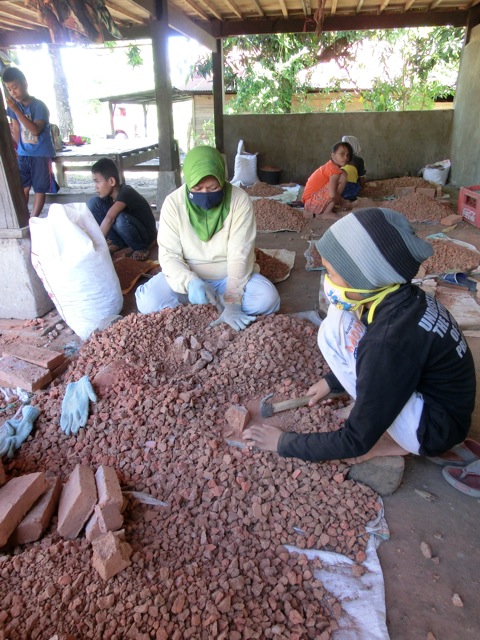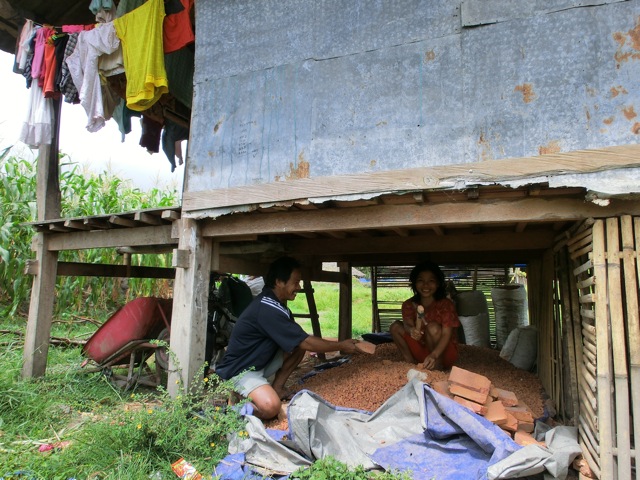CMF International News |
|
Despite obstacles, long-term business-as-mission project produces fruit Posted: 03 Sep 2014 07:51 AM PDT A project that had its roots in business-as-mission classes taught by CMF Executive Director Doug Priest and former CMF missionary Phil Edwards in the 1990s in Singapore continues to grow and produce both spiritual and financial fruit. Weng, a Christian engineer-turned-businessman in Singapore, took those classes and, in 2002, had a vision for a business-as-mission project that would employ people from the poor villages of an unreached people group in a major Muslim nation that neighbors Singapore. The villagers would crush bricks, which are a key ingredient of the growing media (a mixture of stones) that is used to grow plants on ‘skyrise greenery’ in Singapore. The local Christians selected to run the project would mentor and disciples the employees from the people group and their families. “In 2005, a Singapore church selected five native students from a seminary in the country to do ‘field training’ in the chosen community,” said Weng. “Eventually only one, Mr. Abel, chose to stay on with the bricks projects. He is now married and has children, and still works with the project today.” Weng’s Singapore business trains and mentors Mr. Abel in terms of the commercial and technical aspects of the work, while the church nurtures and equips him in the spiritual aspects of his life and ministry. As a strategic move, Mr. Abel set up his own business in his native country in 2012 to act as a middleman between the villages and the Singapore business. He coordinates with the local villagers in crushing the bricks to meet the quality standards and shipping them in 20-foot containers to Singapore by the deadlines. The company has been profitable since 2010, reports Weng. “The crushed bricks are found in more than 80% of all ‘skyrise greenery’ installations implemented by the Singapore public housing authority,” he said. “For each 20-foot container of crushed bricks, 100 to 150 local people are involved over a period of three weeks. While most villagers are involved in the crushing, sieving and packing the materials, the rest of those involved include the drivers, manual laborers and brick-makers. “Today, four villages are impacted, including two that vouched for the work to local government authorities, who have taken notice of the business recently,” he added. “In July, the municipal police rounded up all the villagers who were crushing bricks. The police, through a loud-speaker, confirmed that Mr. Abel is a Christian and expected the village to be up in arms over it. “Instead, the village leader, a Muslim, told police that his village has accepted Mr. Abel because he is a good and righteous person who is fair and firm in business dealings and demonstrates genuine care for the villagers, providing work and paying them on time when the work is completed.” This acceptance speech was the key to the next phase of Weng’s vision: building a Training Center in the area where Weng and Mr. Abel can provide more extensive training and holistic opportunities for the workers. In the long term, part of the facility will be transformed into a low-profile, but public, place of Christian worship. Weng is currently raising funds, about $60,000, to purchase the land for the Center. The ministry goal of the whole project was to impact and win over one village at a time to Christianity, explains Weng. But Christianity is still an ultra-sensitive topic in that part of the country so it is a very difficult situation. “Being a Christian in a Muslim community in that part of the country is a very tough life, facing times of testing, threats and uncertainty almost daily,” said Weng. “There were nearly 100 new believers brought to Christ in the years prior to 2012. Then, in response to a complaint from the community, the local authorities rounded up the ‘young’ Christians for questioning and many fell away. Mr. Abel and his family and the first convert (since 2006) stood firm and were left unharmed, though shaken.” However, since the 2012 incident, Mr. Abel has identified, shared the gospel with, and baptized 10 new believers who come from the four “friendly” villages and work in the brick-crushing project. “He nurtures and equips them spiritually through regular reading and studying of the Word in small group gatherings,” said Weng. “He also visits potential pre-believers in their homes and does some disaster relief work. His wife holds English classes for children and cooking classes for women in the community. They live out every day what the Bible teaches.” |


